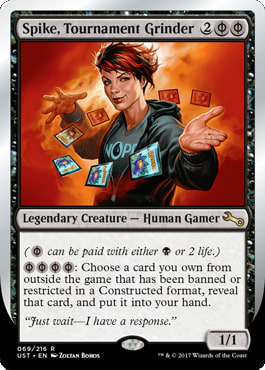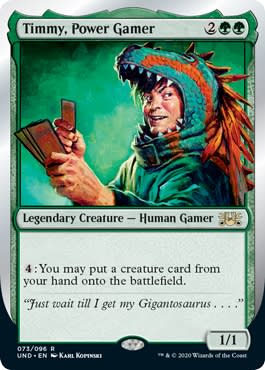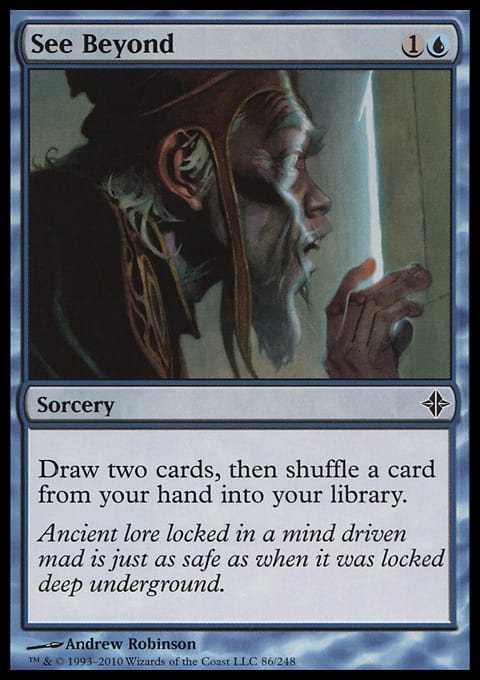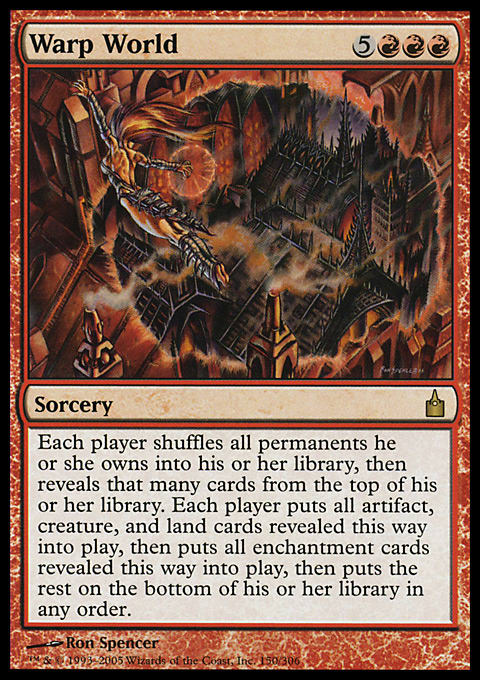This is the third in a series that goes into tremendous detail on the nature of the most common mistakes in Magic in an effort to greater understand their nature, and consequently, overcome them. They will likely also possess knowledge that will apply to your life outside of Magic.
As a heads up: by the time you become aware that you've finished reading this sentence, it'll have already happened. Any attempts you make to control that at this point will result in suffering and failure. You'll have to lie to yourself to make it "true."
Every sentence you ever read or write will already have been read or written by the time you are aware it was done. It's not very intuitive, but this as much control as you actually get.
We recently talked about some helpful ways to think about what it means to play a control role in Magic games, in a pretty general way. This week we're going to aim for a much deeper understanding of control beyond just referring to the traditional strategic role paradigm in Magic. My hope is that readers willing to do the brain work will have a much more fulfilling understanding of how control dynamics work beyond their own personal moment-to-moment agency in Magic games. There's a lot more to how the concept of control works in these situations than doing the common legwork of merely keeping up with what recent Magic game patterns are most seemingly recurrent in tournaments.
We Begin With a Reflection
What is the most you've ever wanted to win at Magic? It can be an individual game, it can be a tournament experience you remember vividly... just, how badly did you want to win, there, in that in-stant?
Among my cancer survivor ilk, there is a subset of driven individuals that just didn't get the message the first time around. While a vast majority of Big C card-carrying club members take the healthy route - give or take - away from denial, owning up to the hard-learned concession that human circumstances and their experien-tial details are not all that changeable, some just want to swim in the bad data. You can't stop them from do-ing it.
Sometimes you just get a shitty hand. And hopefully, you still like it better than no hand at all. Then you play on.
So anyway, this subgroup that can't take a hint about how things really work, in terms of fate and dark, cos-mic stuff, and they basically go to the gym every six hours with the idea that you can beat an impossibly resili-ent set of killer human diseases if you drink enough lettuce shakes and do enough pull ups or whatever.
That level of desperation is a heartbreaking thing to witness, that level of obliviousness to good data.
I hypothesize the most susceptible to this delusion are those that didn't emphasize physical health prior to becoming spontaneously ill. They process it as a punishment for being lazy or something.
I suffer from no such delusion. See, the day before the big surgery where they cut a bunch of my neck out, I was tubing down a meandering mountain river with a couple of other nobodies. One of them, a heavy smok-er a year or two younger than me, pulled out a ciggy, lit it up, and sucked.
"This is such bullshit," he said from his tube, floating on the same river as me but with a few more beer cans. "You're living clean, doing everything right with your health... and of course this happens to you."
As a disciplined Magic veteran(ish), I failed to see the logic. Sounded like bad data to me.
"You've made a jump," I consoled him (and maybe myself). "What we've always known is that certain things make other things more or less likely; nobody ever said the rule was that people who don't smoke cigarettes are immune from health disasters."
The brilliant Zac Hill once put the analogy in terms of speeding tickets. A huge majority of people would likely find themselves intuitively frustrated if they received a ticket for speeding while others around them were going visibly faster, despite it being an irrelevant technical detail. Our entire view of "fairness" is garbage, in other words.
We have absolutely no ability to get comfortable with not being in control. So, we lie to ourselves.
When we think back on these emotional mistakes we realize we're not as good at intuiting our circumstances as we thought, and that our perspectives on what's fair to us and what we have control over are more nu-anced.
Accordingly, we should now zoom back in and wonder if there are aspects of our personal model of Magic control with gaping holes. Either way, in both and Magic and life, here's something you can take for keeps:
Bad data, or insufficient knowledge, is the root cause of virtually any conceivable problem you'll ever confront. If you could know more, you could understand more. Know everything you feel you reasona-bly can.
That's control.
Or at least, that's as much as most of us will ever know of it.
Back to Magic, specifically.
Two Major Types of Vocalized Magic Experiences
If you've been a competitive player for any amount of time, you've read, heard, or contributed to two Magic experience narratives more than any others: either someone did their best by play-ing their best and whatever happened happened (best epitomized with nothing but thumbs up or down); or they're running bad and luck is killing their enjoyment of the game - short-term or otherwise - completely. The former is the attitude put together for professional-ass tournament reports and such. The latter is usual-ly what you hear in the reality of Magic in the tournament wild. It's this weird cross section of competing models that I didn't think about very much until the last few years. It was an elusive thing to observe before, but now that the entire world looks like alternate realities trying with complete futility to coexist at the same point in time, it's a lot easier to spotlight.
Among these two experiences, one of them is dressed up and presented supposedly "elitist" to the point of layperson alienation in maximal service to appearing informed and professional to the target in-group. The other is a top down, brute force, personal hero narrative, faith-at-all-costs ego trip. There are unhealthy hy-brid variations of the two across the spectrum. Astute readers have probably already extracted some kind of news media metaphor here.
But this all concerns deeper problems, beyond our control. And that's where I'd like to point your attention now: to looking back on 2020, the year that brought to me, en masse, existentially concerned peers on the bumpy gravel road of life. The problems I'd been working on for years, on my own, in the af-termath of a shock diagnosis and brutal treatment regimen? Suddenly, everyone was on the same page I was stuck on. My peers felt more collectively... shaky than usual.
Alone, together. That kind of thing.
And somewhere in all these connections about fortune and misfortune and logic leaps, that's where I think the collective model of control in Magic culture (and presumably beyond) got real iffy for me, beyond just the general differences between people who take games at face value, win or lose, and people who genuinely can't help but think the game is out to get them. These competing narratives - meas-ured, projected mastery versus frustration through perceived misfortune - can't possibly both equally de-scribe how Magic actually works most of the time.
How Bad Do You Want It?
So, there you are. You're back in the moment of your past where you wanted to win harder than you've ever wanted to win before.
My next question to you is, did that feeling of wanting it more give you more or less advantage in achieving your goal? What was the biggest influence on whether or not you were successful? Was that moment really you about to exert control over your environment?
Or was it a sentence you'd already read but weren't yet aware you'd read?
There are no shortage of players who falsely equate the sensation of intense motivation to play Magic with an advantage, the way it would be in something more physically competitive. Adrenaline's job is to get you going faster, not to keep you alive or to keep you thinking with maximum clarity. Magic is not a physical sport.
Furthermore, there's a culture of self-blame in Magic results. The number of times I edit-ed articles over the years where a writer genuinely put their self-worth value of themselves into one certain result or one certain outcome, even if the perceived "outcome" was composed of a lot of previous outcomes and other future outcomes looming, would probably surprise most.
How it Actually Works
The idea that you can exercise yourself out of death is bad data, as much as the idea that you can control your Magic tournament outcome just because you haven't experienced it yet. For years, high level players or professional in-groups have peddled the notion that thinking about things out of your control aren't helpful and that you should only focus on the things you can. And while that's a useful guideline in a boatload of situations, there's a really incorrect implication in the margins, a demon of a logic leap too many have made: that you are the sole responsible party for your competitive experiences. And Magic tournaments are hugely influenced by a giant group of factors of which you, per-sonally, have almost nothing to do with. Your involvement in Magic events has to be be-cause you like the experience itself, the rush of sometimes winning, and the connections you make. You like looking at cards and playing with them. It can't be about control the way people act like it is. That's now how the game works.
You don't control your matchups, you don't control your opponents or how honest they are, you don't con-trol who gives you information or of what quality that information is. Hell, if you're really there to win above all else, you've likely even forfeited control over what cards you're choosing to play with. And you sure as hell didn't have control over their design and development. So, what kind of control does that leave you with? That you knew to Thoughtseize their win condition? Did that really feel like that much of a choice to you?
2020 was a year in which a lot of people who thought they had a lot of agency in the world learned they sud-denly didn't. It's a year in which systemic flaws and ugliness showed themselves in various ways. We may as well bring the lesson down to our little corner and stop pretending that Magic tourna-ments aren't a slow motion and intricate round of Fall Guys: you have agency in fun moment-to-moment situations, but beyond that your destiny is a bit in the wind unless you're literally just rampantly cheating.
If someone is telling you that Magic has some sort of secret, some sort of super inside tech, that if it were in your possession it would suddenly unlock all your validation dreams and fantasies, then you are under someone else's control. If you think people have the capacity to "do anything" like life is a Nike commercial built around your experience of determination, you're proliferating data that isn't just bad, it's delusional. You can't do anything you want, you can't win all the time, and you are not in control.
Control Magic
So where does all this leave us? What is the TL;DR of bad data and control? What are the most important points to keep in mind for your future at the Magic tables?
In addition to the aforementioned bold claim about knowledge and understanding from a bit further up, I would try to retain some version of the following:
- Magic is hard, contextual, asymmetrical, at times counterintuitive, and (ideally) highly varied. When you win a Magic game or a something good happens to you while you play Magic, you are largely a quasi-passive participant obeying your reward functions via prob-lem solving. That is perfectly acceptable, even ideal. This combined with some good data will likely produce your best Magic. Additional details are probably various flavors of unhelpful noise.
- If you feel like luck is out to get you and that Magic is using you as a sacrifice to bolster less deserving players to unjust stations above you, perhaps as some kind of cosmic prank, you are mistaken. Practice control of your ego.
- If you've had a lot of success in Magic and you've constructed a brand and a personal fable around the idea that you deserve that more than others because, I mean, you're here, right? You are mistaken. Practice control of your ego.
The truth of Magic lies between these extremes for most of us, where the amount of fac-tors we can control in a given game or tournament are difficult to isolate. I wish the culture, the organized play, the rewards, all of it, could be improved overnight. But they can't be. It takes a collective change in how we model and implement our Magic experience.
All I can do is write an article about it. That's what I'm able to control.
(~_^)
The Rascal
The "Indestructible" Danny West

































